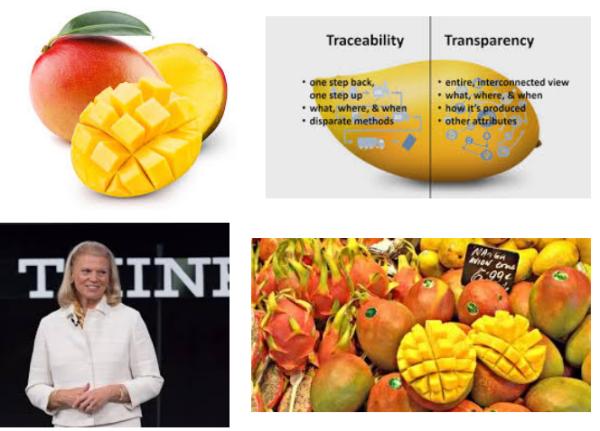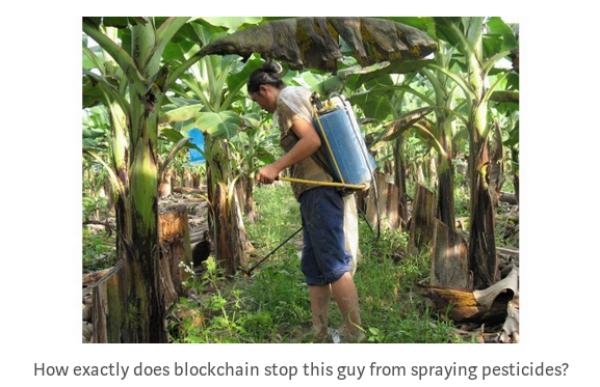Some questions about mangoes, blockchain and fraud
Investors worldwide are pushing blockchain and the Internet of Things inside literally everything. Including food. This leaves many of us, including me, a bit confused and skeptical. Here is one case where a bit more of explanation may make things easier to accept.
“IoT for Blockchain-certified mango!”

Trusted Mangoes via Blockchain. OK. Please explain a bit more
</em></u>
An agtech-focused blockchain startup in Australia just received funding to run a blockchain pilot aimed at supporting mango producers, by ensuring, with the right combination of IoT and blockchain, “food safety, quality, traceability, and authenticity throughout the supply chain”. That combination, says the CTO of that startup, “will provide a new level of quality assurance and trust in how fruits and vegetables go from farm to table”.
We also read that the same system “could prevent spoilage, reduce waste and help producers earn top dollar by demonstrating the provenance of premium crops”.
These news come just a few days after an editorial claiming that “Blockchain is not only crappy technology but a bad vision for the future” by using just “blockchain-certified mango” as one example of that statement:
“Blockchain systems do not magically make the data in them accurate or the people entering the data trustworthy, they merely enable you to audit whether it has been tampered with. A person who sprayed pesticides on a mango can still enter onto a blockchain system that the mangoes were organic.”
More explanations, please
I happen to be one of the authors of a paper about “Digital DIY for self-sustainability of rural areas” (a summary is available in these slides). That paper proposes, among other things, exactly making more digital technology used and useable by farmers. As long as it is appropriate technology, however. On that basis, I believe that public simple, concrete answers to questions like the ones below would do a lot to clarify exactly how all this flood of blockchain and IoT will improve things. Thanks in advance to whoever will provide such answers.
I do understand that sticking to every dot of the whole picture Internet-connected sensors that write into a blockchain is supposed to make frauds like these much harder:

<u><em><strong>CAPTION:</strong>
<a href="https://medium.com/@kaistinchcombe/decentralized-and-trustless-crypto-paradise-is-actually-a-medieval-hellhole-c1ca122efdec" target="_blank">How exactly does blockchain stop this guy from spraying pesticides? Click for source of picture and quote</a>
</em></u>
but allow me to ask:
- the current level of hype around the blockchain is embarrassing, so the first question can only be: is a blockchain really the only, or best method to get all these guarantees against tampering etc.. in this specific case? (the answer is likely yes, but I’d really like to see specific, simple descriptions of why, and how, it is so)
- how do you, just to make one stupid example, prevent dishonest farmers from throwing in every box of blockchain-certified mangoes one or two kilograms of pesticide-ridden ones, grown into another field?
- in general: how do you really, concretely make the whole system fraud-proof? I mean: without buying so much more electronics and/or, for example, plastic-sealed containers at every step, that small, independent farmers could never make a decent profit, even if they bought robots for harvesting?
- pollution: where do all these mountains of definitely non-organic sensors end up, eventually? Production of certified “organic” food with tamper-proofs ways to replace pesticides with e-waste that sooner or later would end up in the wrong places would not be much of a progress, would it?
- interoperability and future-proofness: can the farmers who will install all this IoT stuff into their fields and warehouses integrate it with other systems of their choice? If farmers find the whole certification service too complicated or too expensive, can they switch to another provider? Will all that hardware and software infrastructure remain usable even if the startups that installed it go out of business? If those startups are bought by some multinational, will this leave farmers without any control of their work?
- in other words: is this going to be just a digital version of the Monsanto seeds and pesticides that farmers MUST buy every year, unless they want to face lawsuits, or other losses?
Who writes this, why, and how to help
I am Marco Fioretti, tech writer and aspiring polymath doing human-digital research and popularization.
I do it because YOUR civil rights and the quality of YOUR life depend every year more on how software is used AROUND you.
To this end, I have already shared more than a million words on this blog, without any paywall or user tracking, and am sharing the next million through a newsletter, also without any paywall.
The more direct support I get, the more I can continue to inform for free parents, teachers, decision makers, and everybody else who should know more stuff like this. You can support me with paid subscriptions to my newsletter, donations via PayPal (mfioretti@nexaima.net) or LiberaPay, or in any of the other ways listed here.THANKS for your support!